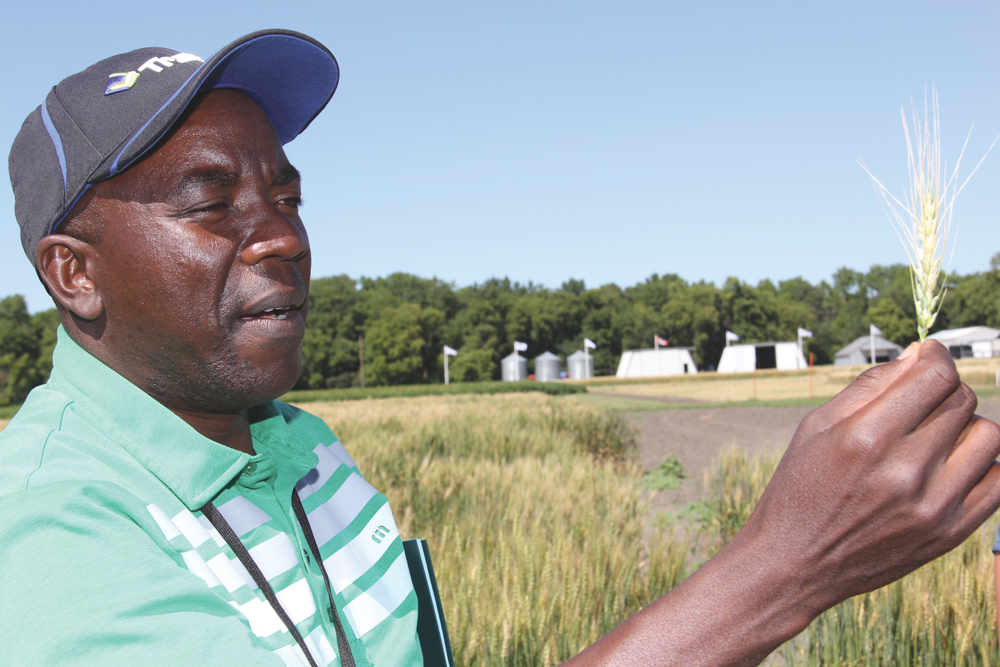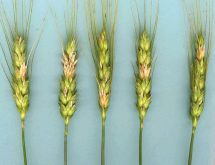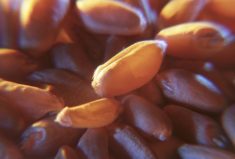Syngenta’s decision to scrap its Canadian wheat-breeding program is a wake-up call, industry officials warn.
Canada needs an improved royalty system to reward wheat breeders for new varieties or more private breeders could pull out, according to some, while others say it’s critical public breeders are well funded in case they do.
But a recent survey of Prairie farmers found a majority don’t support either of the two royalty options — end point and trailing (Seed Variety Use Agreement) — developed by the seed industry after two years of study and presented to farmers last winter by federal government officials.
Read Also

Mazergroup’s Bob Mazer dies
Mazergroup’s Bob Mazer, who helped grow his family’s company into a string of farm equipment dealerships and the main dealer for New Holland machinery in Saskatchewan and Manitoba, died July 6 from cancer.
Keystone Agricultural Producers president Bill Campbell says while he’s disappointed he expects it was a business decision.
“There may be more to it than that (royalty question), but I am sure there will be people who will make the connection, or inference, but this is a Syngenta business decision,” he said in an interview Nov. 15.
“Just on my small knowledge of wheat varieties I don’t know of a lot of farmers who are using Syngenta wheat varieties. So that would be part of it.”
Farmers support cereal variety development, but want a broad approach, which doesn’t necessarily mean farmers throwing more money into it, Campbell said.
Why it matters: The grains sector needs to find a balance between farmer interests and rewarding breeders and the organizations they work for.
“This (Syngenta) announcement is not going to go well with other companies already invested, or wanting to invest (in wheat breeding in Canada),” Canterra Seeds president and CEO Dave Hansen said in an interview Nov. 14.
“I’ve got France (Limagrain, Canterra’s partner in Canadian wheat breeding) calling me and they’ve seen the same announcements. They want to know what the hell is going on.”
Canterra is a minority shareholder in the Limagrain Cereals Research Centre set up in Saskatoon in 2016.
“We’re pumping millions a year into that program,” Hansen said.
“We built this business on the idea that there would be a value creation system in place by the time that we were starting to deliver products to the market. We launched our first two products this year already. That program is turning out a lot of really good material and they (Limagrain) are saying, ‘hey, if this (changes to the royalty system) doesn’t happen we’re not in the game.’”
Syngenta announced Nov. 13 it is ending its cereal seed research and development program at year’s end.
Syngenta will continue to market its established and newly registered wheats in Canada, it said in a news release.
Syngenta will also expand its Canadian crop input and seed treatment business.
When asked in an interview if Syngenta’s decision was influenced by the failure to implement a new royalty system, Nancy Tout, Syngenta Canada’s head of research and development, said: “The decision we have taken… is independent of the consultations and the seed value capture system. But that having been said I think… it really highlights the challenges in the Canadian marketplace today regarding the investment in that space and the operation of our research and development programs in Canada for certain crops.”
Tout noted the lack of clear timelines for completion of the royalty consultations and development and any implementation.
“So in the absence of that clear path and timeline… we had to take that decision about what we know today, and it’s our opinion that we don’t anticipate the operating environment to change significantly in the foreseeable future,” she said.
“We are trying to really focus the investments to make sure that we can add value to the Canadian grower in a different kind of a way.”
Asked if Syngenta would have continued wheat breeding here if a new royalty system was in place, Tout replied: “It’s difficult to crystal ball that, but again we took the decision independent of the consultations.
“We looked at the finite resources we have from a Canadian perspective to invest back in R&D and took that decision based on a lot of different factors.”
Syngenta’s release said the company will also, where appropriate, bring new cereal varieties to Canadian farmers through “licensing arrangements.”
But in an interview Tout said: “That would be a challenge because that still requires a local effort to bring those varieties (to Canada), whether from the U.S. or Europe.
“In a different model we’d entertain different licensing arrangements…
“We are certainly open to collaborations in that space, but I think there’s a misunderstanding about the system when people say, ‘just bring it across and let’s just make it happen.’ The system we have in Canada is not as easy to be able to do that versus the U.S.”
Meanwhile, Syngenta is not cutting its wheat breeding elsewhere, Tout said.
“Canada has its own unique challenges and system and with that in mind it was very much a local decision and specific to Canada,” she said.
Lack of returns
No Canadian wheat breeder is getting an adequate return on investment, Hansen said.
“None of us make any money in the pedigreed (seed) business — zero,” he said. “We do this for the service of our seed grower shareholders whether you are FP (Genetics), SeCan, Canterra, Alliance… it’s a break-even business.”
Only 25 to 30 per cent of the wheat sown annually in Western Canada is pedigreed, which includes a royalty to breeding companies, Hansen said.
“In any industry if there’s not investment and innovation we’re going to be going backwards and we’re concerned about that,” he added.
“This is about making sure that we’re building a bigger, stronger ag industry here in Western Canada.”
Todd Hyra, SeCan’s business manager for Western Canada, says he is sad and disappointed by Syngenta’s move — sad because of personal connections to Syngenta’s wheat-breeding program earlier in his career, and disappointed because Canadian farmers will no longer have the “global reach” a multinational firm offers.
“The other piece that it does show is the need to make sure that we keep the public program strong because if things aren’t working out they (seed companies) can pack up and leave,” he said. “So we want to encourage that investment and we want to create an infrastructure and a system that rewards private breeders to bring their innovation to Canada. But at the same time if they fail we want to make sure the crops farmers rely on, we have a fall-back for them.”
The Canadian Seed Trade Association (CSTA) doesn’t comment on decisions made by member-companies, executive director Dave Carey wrote in an email.
“CSTA has long expressed concerns about the current intellectual property environment for cereals in Canada and as such has been strong proponents of the ongoing ‘value creation’ consultations,” he added. “There is no silver bullet for incentivizing private sector investment in cereals, but we do believe a value creation system, such as the Seed Variety Use Agreement (trailing royalty) would make Canada a more attractive place for Canadian and international cereals companies to make investments in.”
Value creation consultations, which ceased during spring seeding and were on hold during the federal election, are expected to resume after the minister of agriculture is sworn in and briefed.
Some Syngenta wheats have been popular
Some of Syngenta’s wheats have been popular in Canada, says Todd Hyra, SeCan’s business manager for Western Canada.
“5602 was one of the first varieties with an MR (moderately resistant to fusarium head blight) rating in Canada,” he said. “That was a big product back in my days at Proven Seeds in the early 2000s.
“5700 PR was the No. 1 CPS (Canada Prairie Spring wheat) for a while. It changed the class. It was part of the new group of products that had improved CPS milling quality.”
In an interview Nancy Tout, Syngenta Canada’s head of research and development, downplayed the prospect of Syngenta commercializing varieties it develops elsewhere in Canada.
SeCan has successfully commercialized wheats in Canada from other countries, such as Pasteur, but because it’s in the Canada Western Special Purpose class it wasn’t required to meet certain milling quality standards. As a result, while high yielding, Pasteur, and others in the special purpose class are not big sellers, Hyra said.
“If you want to be playing in the big CWRS (Canada Western Red Spring wheat) class then you really do need to have the quality, competitive yield and the disease package to make sure that it’s suited to Western Canada and that takes time,” he said.




















